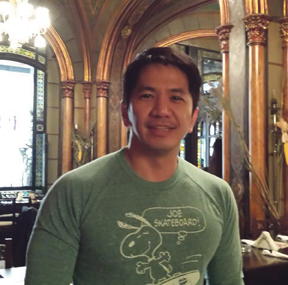Tell us about your field and your stay in NYU School of Medicine.
[In] NYU (New York University) School of Medicine, I did Neurogenetics, it’s the study of the genetic basis of a lot of the Neurogenetics disorder like Alzheimer’s disease Parkinson’s people with lysosomal storage disorder stroke and stuff like that. We were doing the mutation so we’re trying to find what was the mutation that was associated with the disorder that the patient manifested with. It’s finding the mutation that caused the disorder. I learned a lot, when I went there I didn’t know anything about genetics. Genetics is a subject that a lot of people or doctors hate because it’s really difficult, so I went there empty handed [and] after the three years I learned really a lot from the different professors.
What does it take to be a really good doctor?
You have to be smart: both intelligent/wise [and] street smart. In the field you have to be smart in dealing with people; you also have to learn [how] to deal with other people [and] you have to have the knowledge. Most importantly you have to have the care for your patients and compassion for them besides the ability to cure them. The three C’s - courtesy, care , compassion for your patients.
Initially I wanted to stay [in New York], it’s one of the greatest cities in the world. I already got an offer and can afford to pay in full the amount of money [the scholarship] gave me in case I don’t come back. It could have been very easy for me and just stay there for good, but at the end of the day you would really want to come back and serve no matter how difficult the situation in your country is. There’s really no place like home. At the end of the day will you really be fulfilled with just making a lot of money while serving other lahi or foreigners, when you could have come home and serve your countrymen? Yun ang pinaka importante.
The people here are really appreciative; treating the patients here is not like a business, you pay for my services and I give you what you paid for. Here, it’s more of a personal relationship. Besides treating them, they really appreciate what you do for them. Even if you make so little at the end of the day you really feel fulfilled and happy that you are able to serve your patients. And they are thankful for what you did to them—that’s what matters the most.
Why did you choose Vigan City to settle in?
I chose Vigan just accidentally. Initially in the Philippines, I didn’t have a place to practice because wala pa akong investments sa hospitals. There was this doctor from Laoag who used to come here, he asked me to try Vigan for my two year service according to the foundation, but I fell in love with the city and the people. Initially it was just an obligation but [now] it’s been more than ten years already. The people [are very simple and very appreciative, mas marami akong natutulungan dito compared to when I’m in Manila. There are plenty of doctors there, specialists, but here I’m one of the first neurologists so mas marami akong natulungan here. I could have served less people if I base myself in Manila because there’s plenty of them there.
Any message for the incoming scholars?
To incoming scholars: do your best and be patient. Initially going abroad is hard with a lot of adjustments but as long as you’re determined nobody can defeat you. Also tell yourself that you’re not just doing this for yourself but you want to learn and come back and serve my countrymen.


 RSS Feed
RSS Feed